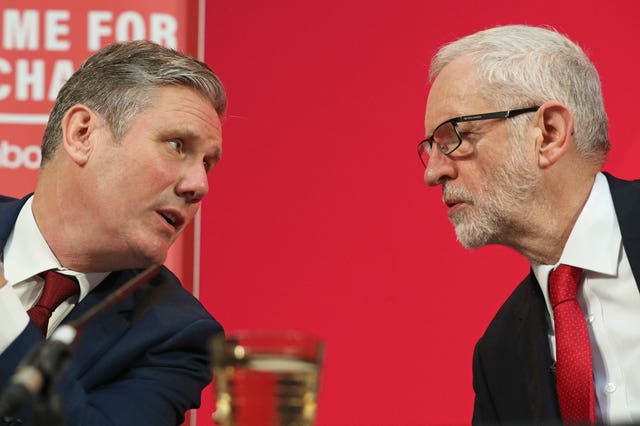Labour will pay “substantial damages” to former employees who contributed to a TV programme on its handling of antisemitism. The party also issued an apology over what it said were “defamatory and false allegations” made following a BBC Panorama investigation.
Jeremy Corbyn said it was “disappointing” that the party had settled the claim, adding that it was a “political decision, not a legal one”.
Seven former employees from the party’s governance and legal unit, who were responsible for the investigation of allegations of misconduct by party members, sued Labour after it issued a press release describing them as having “personal and political axes to grind”.
The legal action followed the broadcast in July 2019 of a BBC Panorama programme titled “Is Labour Anti-Semitic?”.
At a brief hearing in London on 22 July, the former employees’ barrister William Bennett QC said: “The whistleblowers were highly critical of the Labour Party’s approach to tackling antisemitism within its ranks.”
He told Justice Nicklin: “Before the broadcast of the Panorama programme, the Labour Party issued a press release that contained defamatory and false allegations about the whistleblowers.”

Bennett said Labour “accused the whistleblowers of having acted in bad faith during and after their employment with the intention of harming the Labour Party” – allegations he said were “untrue and defamatory”.
At the same hearing, Labour also apologised to John Ware – the journalist who made the Panorama programme – for accusing him of “deliberate and malicious misrepresentations designed to mislead the public”.
The party agreed to pay “substantial damages” to the journalist.
Labour Party members have a right to accountability and transparency of decisions taken in their name, and an effective…
Posted by Jeremy Corbyn on Wednesday, July 22, 2020
In his response to his party’s settling of the claim, however, Corbyn said:
Our legal advice was that the party had a strong defence, and the evidence in the leaked Labour report that is now the subject of an NEC inquiry led by Martin Forde QC strengthened concerns about the role played by some of those who took part in the programme.
As The Canary previously reported, the leaked Labour report alleged that:
“hyper-factional” opposition to the ex-leader among former senior officials was a key factor in hindering effective handling of complaints regarding alleged antisemitism. At the same time, it argues there was “no evidence” that such complaints received different treatment from other complaints.
Labour’s handling of antisemitism allegations under Corbyn’s leadership is the subject of an inquiry by the Equality and Human Rights Commission – Starmer has already received a draft report from the watchdog.
Outside court, shadow attorney general Lord Falconer said: “It is for the (Equality and Human Rights) Commission to make its findings public when it chooses… but we have brought to an end a chapter when the Labour Party was accusing whistleblowers of behaving dishonestly and I’m incredibly glad that we have brought it to an end.”
In a statement, the party said: “Antisemitism has been a stain on the Labour Party in recent years. It has caused unacceptable and unimaginable levels of grief and distress for many in the Jewish community, as well as members of staff.
“If we are to restore the trust of the Jewish community, we must demonstrate a change of leadership.”
But Len McCluskey, general secretary of the Unite union, joined Corbyn in condemning the decision.
Today’s settlement is a misuse of Labour Party funds to settle a case it was advised we would win in court. The leaked report on how anti-semitism was handled tells a very different story about what happened.
— Len McCluskey (@LenMcCluskey) July 22, 2020
In his response, Corbyn further said: “The decision to settle these claims in this way is disappointing, and risks giving credibility to misleading and inaccurate allegations about action taken to tackle antisemitism in the Labour Party in recent years.
“To give our members the answers and justice they deserve, the inquiry led by Martin Forde must now fully address the evidence the internal report uncovered of racism, sexism, factionalism and obstruction of Labour’s 2017 general election campaign.”


















